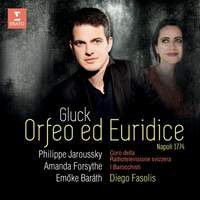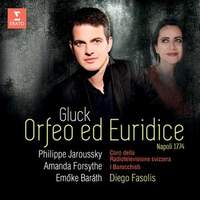Recording of the Week,
Philippe Jaroussky sings Gluck's Orfeo
‘Don’t tell me, it’s the rarely-performed version for the second Tuesday of the month, adapted for heldencastrato with additional arias by Farinelli’s godson’s next-door neighbour’ – eyes were rolled chez Presto even before I drew breath to wax lyrical about why this world premiere recording of Gluck’s Orfeo ed Euridice in the 1774 Naples version was going to be something worth writing home about. My enthusiasm for Gluck in general (and in particular my fascination with the myriad incarnations of his most popular opera) isn’t necessarily shared by all of my colleagues - but this concise, intensely dramatic new account from Diego Fasolis and I Barocchisti went some way to winning them over even before Philippe Jaroussky’s angelic hero had packed his bags for a terms-and-conditions-apply excursion to Hades.
Few mainstream operas have been nipped, tucked and generally made over as many times as Orfeo: the title-role was originally written for alto castrato, but subsequently reworked for high tenor (in fact the ‘1774 edition’ usually refers to this Paris adaptation, recorded by Juan Diego Flórez a few years back) and later (by Berlioz) for the coloratura contralto Pauline Viardot. The majority of recordings are based on the 1762 Vienna version, but Fasolis and Co. give us the score as presented in Naples in early 1774, with the title-role customised for male soprano Gasparo Pacchiarotti and replacement coloratura fireworks to cater for the Neapolitan appetite for vocal showmanship.

For the first two acts, the differences are largely limited to twists and turns in the recitatives which manoeuvre the hero’s arias into slightly higher keys in deference to the new star singer. It's in the Act Three encounter between Orfeo and his wife that things really get interesting: the duet ‘Vieni, appaga il tuo consorte’ (in which marital friction ensues from the hero’s cryptic mandate that Euridice must follow in his footsteps without expecting anything in the way of eye-contact) is in fact not by Gluck at all, but the work of one ‘Egidio Lasnel’: the anagrammatic nom de plume of the aristocrat Diego Naselli, a pupil of Davide Perez whose music appears on Ian Page’s marvellous new Mozart in London anthology and was almost certainly encountered by the twelve-year-old composer on his year-long visit to the city.
Naselli’s two contributions certainly emphasise the fact that Mozart’s own music-dramas were only just around the corner by the time Orfeo came to Naples. The new duet for the estranged spouses (significantly longer and more florid than its 1762 counterpart) wouldn’t sound out of place in an early Mozart opera, and the Sturm und Drang drama of Euridice’s ‘Che fiero momento’ is replaced by a cavatina and cabaletta that delivers the vocal pyrotechnics which Neapolitan opera-goers had come to expect: the flurry of scales ascending to high C prefigures Konstanze’s great display-piece ‘Marten aller Arten’ in Mozart’s Die Entführung eight years later, which prompted Emperor Joseph’s apocryphal shade-throwing about ‘too many notes’. Amanda Forsythe comes through with flying colours here, endowing music that verges on the prolix with real emotional depth – in this version, and in this interpretation, one truly sees why the opera is officially entitled Orfeo ed Euridice rather than simply Orfeo.
Small wonder that Philippe Jaroussky’s seraphic hero placates the Furies of hell (who are an especially thuggish bunch here) with a single aria – the crystalline sweetness of his tone is such that he seems to have emanated from the ‘puro ciel’ of the Elysian Fields himself. The higher tessitura of this version places a role which would normally lie rather low for him smack in his hitting-zone; what a pity that this Orfeo doesn’t hang around en route to Hades to sing the virtuoso ‘Addio, miei sospiri’, as the coloratura-hungry Neapolitan audience would surely have lapped it up. Emőke Baráth’s Amore is so characterful that I wished that whoever oversaw the reworking for Naples had expanded the role a little; she imbues ‘Gli sguardi trattieni’ with a languid sensuality that has you wondering whether she’s more honey-trap than deus ex machina.
This vividly theatrical recording is sure to appeal to a wider audience than Orfeo completists: whilst it fills a significant gap in the opera’s complex recorded history, it’s also essential listening on its own terms.
Philippe Jaroussky (Orfeo), Amanda Forsythe (Euridice), Emőke Baráth (Amore) Coro della Radiotelevisione Svizzera & I Barocchisti, Diego Fasolis
Available Formats: CD, MP3, FLAC, Hi-Res FLAC
Philippe Jaroussky (Orfeo), Amanda Forsythe (Euridice), Emőke Baráth (Amore) Coro della Radiotelevisione Svizzera & I Barocchisti, Diego Fasolis
Available Format: CD




